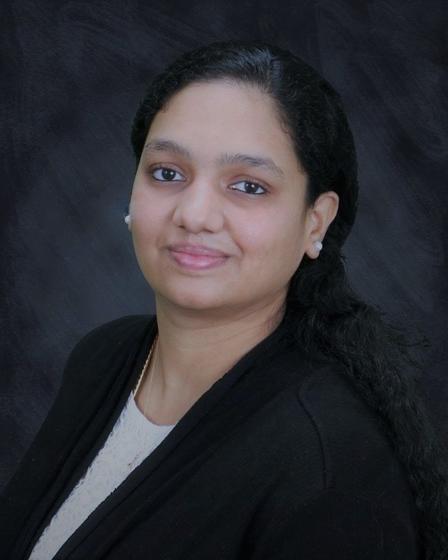Read More Graduation Stories
- April 4, 2024
- December 14, 2022
- May 23, 2022
- May 21, 2022
- May 13, 2021
For her Master of Health Administration capstone, George Mason University graduate student Akshaya Chinnathevar Ramesh is interning at The U.S. Department of Health and Human Services (HHS) on Capitol Hill and working with a team of analysts working on required reports to Congress on the effects of the No Surprise Act.

“I'm from India, so people ask why I’m so interested in health care here. In India it’s much easier. I can go to a hospital, any hospital, just pay from out of pocket, and I am good to see the doctor. Here I felt that people don't have that,” said Chinnathevar Ramesh, who moved to the United States in 2016 and lives with her husband and four-year-old son.
“There's nothing called universal coverage, and you have to wait months to get an appointment,” she continued. “That's exactly what I experienced when I came to the U.S.”
Chinnathevar Ramesh graduates with a degree in Health Systems Management this month and hopes to combine her research and analytical skills to improve health care policies.
Part of the work she is doing at her internship deals with surprise billing, which takes place when a patient goes to an emergency room or an in-network facility and is unaware they are receiving services from an out-of-network medical professional. The patient then receives the bill that is not fully covered by the insurance, Chinnathevar Ramesh said. The No Surprise Act aims to alleviate the financial burden caused by these bills.
“Prior to January 2022, the issue of surprise billing had not been addressed at the federal level, and this is a significant step toward improved affordability of health care,” said Chinnathevar Ramesh, who has been researching the topic well before her internship.
Chinnathevar Ramesh spoke to College of Public Health Professor Brenda Sheingold about her interest.
At HHS, Chinnathevar Ramesh worked under the supervision of Joel Ruhter in the Office of the Assistant Secretary of Planning and Execution. “He was my major guidance. We analyzed what all the states did last year and discovered there were about 15 states that did not have any protection at all.”
During her Mason career, Chinnathevar Ramesh served as the president of Rising Health Care Leaders @Mason and led HAP's return to in-person student networking at its annual spring symposium in March.
“[My team and I] had very good exposure, and we got a chance to partner and work with the National Capital Healthcare Executives as well,” said Chinnathevar Ramesh.
One of the symposium speakers was also the HHS director of research. “I encouraged her to reconnect with him to see if there was anyone that he could direct her to, kind of like the snowball effect,” said Sheingold. “This is a network-intensive degree, and my job is to help students discover their own strengths and feel confident.”
